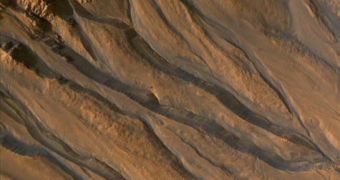Recent observations done by NASA's Mars Reconnaissance Orbiter (MRO) revealed the existence of carbonates, minerals that cannot exist in acidic waters. And while this may not seem like much, consider the fact that acid water usually dissolves these minerals, and that scientists believed that all life forms that could have been sustained by the planet were wiped out long ago, when most of the water on Mars became highly acidic.
Now, having discovered these minerals, experts say that some regions of the planet might have escaped the acidic doom and could have housed life, as in bacteria and other primitive organisms, in their watery lakes and gullies. Though how much water existed on Mars and how it disappeared remains a mystery, scientists say that the conditions in the areas that remained unaffected by acid would have been “just right” to sustain life.
"Primitive life would have liked it. It's not too hot or too cold. It's not too acidic. It's a 'just right' place," shares Brown University graduate student Bethany Ehlmann, who is the main author of a study analyzing the finds, to be published in the December 19th edition of the journal Science.
Suspicions of water on Mars were prompted by the fact that previous reconnaissance missions had discovered “familiar” patterns on the planet's soil, which resembled those left behind by water flowing downstream. The gullies ran over each other, suggesting the irregular flow that water had before forming a small creek or river.
NASA says that sending probes to the areas where carbonates were found will probably yield little results, in terms of retrieving a viable organism. But it's very likely that life – if there ever was such a thing on Mars – could have survived in those regions until all water eventually dried off or became inhospitable. But the new find shows, at the very least, that the conditions on the Red Planet were not as harsh as they were first thought to be.

 14 DAY TRIAL //
14 DAY TRIAL //